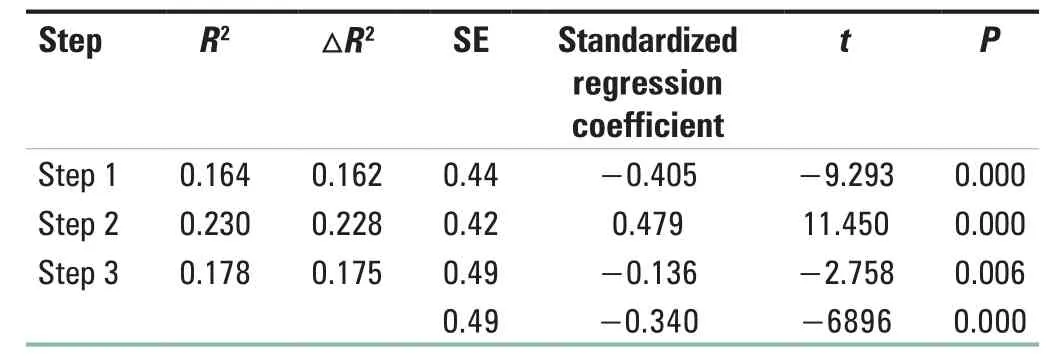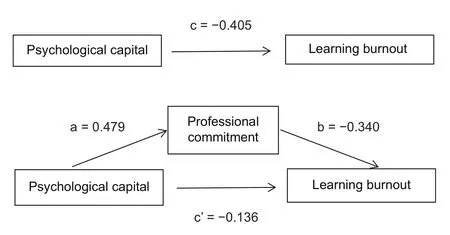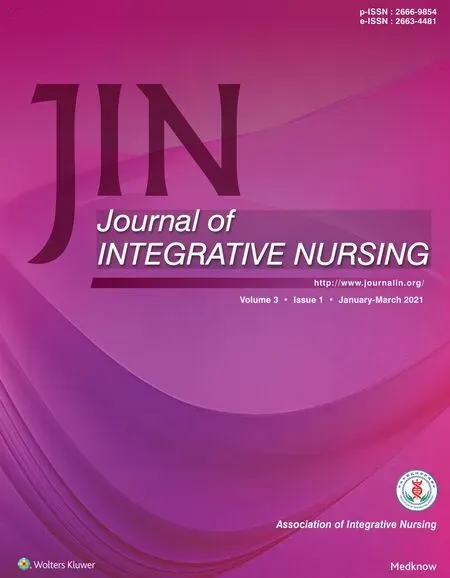Mediating effect of undergraduate nursing students’professional commitment on positive psychological capital and learning burnout
Huanze LI, Hongfang CHEN,Miaoqing ZHUANG, Yue LIU, Jiayi WANG,Luyu ZHANGSchool of Nursing, Shaanxi University of Traditional Chinese Medicine, Xianyang, Shaanxi, China; Department of Nursing,Shaanxi Provincial Hospital of Traditional Chinese Medicine,Xi’an, China
ABSTRACT
Objective: The objective of this study is to explore the mediating role of professional commitment of undergraduate nursing students between positive psychological capital (PsyCap) and learning burnout.
Materials and Methods: A cluster sampling method was used to survey 442 students of a bachelor’s degree in freshman to the junior in a medical college in Shaanxi Province.
Results: Professional commitment was positively related to positive PsyCap (= 0.487, P < 0.01), while positive PsyCap and professional commitment were negatively related to learning burnout (r = ?0.456, r = ?0.411, P all < 0.01). There are certain mediating effects of professional commitment in the relationship between positive PsyCap and learning burnout. The mediating effect value of professional commitment is ?0.065,accounting for 16.08% of the total effect.
Conclusion: Nursing educators in medical colleges and universities should focus on developing and training the positive PsyCap of undergraduate nursing students, thereby enhancing and stabilizing their professional commitment level and reducing the risk of learning burnout.
Keywords: Learning burnout, mediating effect, professional commitment, psychological capital, undergraduate nursing student
INTRODUCTION
Nursing talents play an important role in the entire social health and elderly service talent team.[1]In 2015, geriatrics,rehabilitation, and nursing talents were listed as urgently needed talents. To alleviate the continuing shortage of nurses, stabilize the nursing team, and achieve higher education and professionalization of nursing education while continuously expanding enrollment, the number of nursing students has increased year by year, and undergraduate nursing students (hereinafter referred to as undergraduate nursing students) are facing more arduous learning tasks,prone to negative attitudes and behaviors, and burnout to learning. Psychological capital (PsyCap) refers to a positive mental state shown by an individual in the process of growth and development.[2]Studies have shown that continuous and effective development of PsyCap will have an impact on the cognition and behavior of nursing students, and can effectively reduce learning burnout.[3]Another study shows that the PsyCap of nursing students is closely related to professional commitment.[4]To this end, this research aims to explore the relationship between undergraduate nursing students’ PsyCap, professional commitment and learning burnout, and to provide a basis for improving their professional commitment level, increasing their PsyCap, and effectively alleviating their learning burnout.
MATERIALS AND METHODS
Study objects
Using a convenient cluster sampling method, 442 full-time nursing undergraduates from a medical school in Shaanxi were selected for questionnaire survey. Those students were freshman to Junior in school who were willing to participate in this study and signed informed consent.
Methods Survey tools
The questionnaire survey includes the following four parts: (1)General survey form: it has eight categories including gender,grade, location of household registration, application for examination, reason for attending, academic performance,whether to serve as a student leader and family income. (2)PsyCap Scale (PsyCap): it was compiled by Zhangetal.[5]in 2009,mainly including 26 items in four dimensions of self-efficacy,hope, optimism, and resilience, and each item was scored using the 7-level Likert scale. The Cronbach’ α coefficient of the total scale is 0.868. (3) Nursing Professional Commitment Scale: It was revised into 3 dimensions by Lu[6]in 2006 using the two-dimensional theory, with a total of 23 items, using the 5-level Likert scoring method, and the Cronbach’α coefficient of the total scale was 0.787. (4) Learning burnout scale for college students: it is compiled by Lianetal.,[7]including 20 items in 4 dimensions, using the 5-level Likert scoring method.The higher the score, the higher the learning burnout. The Cronbach’α coefficient of the total scale is 0.875.
Survey method
This study adopts a questionnaire survey method. Before the survey, the researchers explained the purpose and significance of the survey to the students. After obtaining written informed consent, the researchers distributed questionnaires uniformly and collected them on the spot after the students made independent responses. Totally 475 questionnaires were distributed and 469 were recovered,with a recovery rate of 98.74% (469/475). After excluding 27 invalid questionnaires, 442 valid questionnaires were finally collected, with an effective rate of 94.24% (442/469).
Statistical analysis
After the data are checked, EXCEL double data entry, SPSS25.0 software was used for statistical analysis. Measurement data are described by mean ± standard deviation; the single-sample Kolmogorov–Smirnov test method is used to test whether the sample conforms to the normal distribution;the Spearman rank correlation analysis method is used for correlation analysis; the regression analysis method and the Bootstrap method proposed by Wen and Ye[8]are used to test the mediation effect.
RESULTS
General information of nursing undergraduates [Table 1]Scores of each dimension of psychological capital,professional commitment, and learning burnout

Table 1: General information of undergraduate nursing students (n=442)
The total score of PsyCap is 120.21 ± 15.07, and the average score is 4.62 ± 0.58, and the score for each dimension is 4.50 ± 0.84 for self-efficacy, 4.18 ± 0.64 for resilience, 4.86 ± 0.74 for hope, and 5.05 ± 0.92 for optimism. The total score of professional commitment is (65.02 ± 7.80), the average score is (2.82 ± 0.34),and the three dimensions are the willingness to the professional effort (2.73 ± 0.70), the willingness to stay in professional career (2.35 ± 0.77), and professional recognition (3.57 ± 0.68). The total score of learning burnout is 59.55 ± 7.24, and the average score is 2.98 ± 0.36, and the scores in the three dimensions are 2.70 ± 0.66 for depression, 3.03 ± 0.49 for misbehavior,3.30 ± 0.56 for achievement low sense, respectively.
Correlation analysis of psychological capital, professional commitment, and learning burnout
Spearman rank correlation analysis showed that undergraduate nursing students’ PsyCap is significantly positively correlated with professional commitment (r= 0.487,P< 0.01), PsyCap and professional commitment are significantly negatively correlated with academic burnout (r= ?0.456,r= ?0.411,Pall < 0.01).
The mediating effect of professional commitment in psychological capital and learning burnout
Wen and Ye[8]mediation effect test was used: (1) Regression analysis was used with learning burnout as the dependent variable and PsyCap as the independent variable; (2)Regression analysis was used with professional commitment as the dependent variable and PsyCap as the independent variable; (3) Taking learning burnout as the dependent variable, PsyCap and professional commitment as independent variables into the regression equation, due to the intervention of professional commitment, the main effect of PsyCap on learning burnout decreased from 0.405 to 0.340, indicating that professional commitment plays a part of mediating role in the relationship between PsyCap and learning burnout,and the mediating effect is 16.08% [Table 2 and Figure 1].

Table 2: Analysis of the mediating effect of professional commitment between psychological capital and learning burnout

Figure 1: Hypothesis of the mediation model of professional commitment between psychological capital and learning burnout Notes: a × b: Mediating effect; c: Total effect; c′: Direct effect
Bootstrap method test
The nonparametric percentile Bootstrap method with strong bias correction is used to test the mediation effect.Standardize each variable with learning burnout as the dependent variable, PsyCap as the independent variable,and professional commitment as the intermediary variable.Through the process plug-in in the SPSS software, select model 4, set the sample size to 5000, and the confidence interval (CI) is 95%.[8,9]The results show that PsyCap has a significant direct effect on learning burnout, and the indirect effect of professional commitment on PsyCap and learning burnout is 0.0651 (95% CI: ?0.1234–?0.0066), excluding 0, that is, the mediating effect is statistically significance,indicating that the mediation effect is established, in which the effect value accounts for 16.08% of the total effect value [Table 3].

Table 3: Bootstrap method test
DISCUSSION
The results of this study show that the total average score of PsyCap of undergraduate nursing students is (4.62 ± 0.58),which is slightly higher than the theoretical median of 4,indicating that the PsyCap of undergraduate nursing students is at a medium level. It is consistent with the results of domestic scholar Gaoetal.[10]and domestic ordinary college students.[11]The reason may be related to the fact that the majority of the subjects in this survey are female (89.37%),the majority of students are from villages and towns (70.14%),and the number of applicants who choose to take the exam is small (5.43%). Previous studies have confirmed that female students and rural areas are the risk factors for college students’ PsyCap,[10,11]and other studies have shown that the level of PsyCap of students who choose their majors independently is significantly higher than that of students who choose their majors after listening to others’suggestions.[12]Undergraduate nursing students have a total average score of (2.82 ± 0.34) for professional commitment,which is at a low level, with the highest professional recognition score (3.57 ± 0.68), and the lowest score of professional career stay willingness (2.35 ± 0.77), which is consistent with the results of domestic scholars.[13]The reason may be that nursing became the first-level discipline in 2011,[14]and the nursing career is developing vigorously. With the intensification of the aging society and the increasing demands for medical care and elderly care services in our country,[1]nursing students recognize the important role of nursing in social health. However, laborious and complicated clinical nursing work and strained relationship between doctors and patients make them hesitate to stay in their future careers. The total average score of undergraduate nursing students’ learning burnout is (2.98 ± 0.36), at the lower-middle level, which is consistent with the existing research conclusions by Liuetal.[15]In this study, the first choice of undergraduate nursing students to apply for nursing majors was only 17.87% [Table 1]. It shows that most students lack a certain professional interest. During school, students face complex and heavy theoretical knowledge, have fewer opportunities to contact the real medical environment, and show a negative state of depression, boredom, and low sense of accomplishment.
The results of this research show that the PsyCap of undergraduate nursing students is significantly positively correlated with the total score of professional commitment (r= 0.49,P <0.01), that is, the more PsyCap,the higher the level of professional commitment, which is consistent with the results of the research conducted by Song and Chen.[4]Studies have shown that it is appropriate to explore PsyCap and nursing professional commitments as necessary internal resources for students planning to engage in nursing work.[16]PsyCap enhances students’internal motivation and makes them feel the meaning of professionalism and triggers students’ professional learning enthusiasm and accept the challenges of professional learning, thereby increasing investment in professional learning. There is a close negative correlation between PsyCap and the total score of learning burnout (r= ?0.46,P <0.01), that is, the more PsyCap, the lower the learning burnout. This is consistent with the research of Liuetal.[3]Another study shows that external environmental factors and individual internal factors are important factors that affect learning burnout.[17]When external environmental factors continue to exist, adjusting individual’s internal factors can become an important way to prevent and relieve learning burnout. PsyCap is an individual’s positive mental state that can be measured and developed and promotes learning,so it has a positive effect on improving students’ learning enthusiasm and reducing learning burnout.
The results of this study also found that professional commitment has a partial mediating effect between undergraduate nursing students’ PsyCap and learning burnout,and the mediating effect accounts for 16.05% of the total effect [Figure 1], indicating that PsyCap can directly affect learning burnout or indirectly affect learning burnout through professional commitments. As PsyCap is an individual’s self-confident positive mental state, positive expectations for future, recovery from adversity, and perseverance toward the goal,[18]this positive psychology and positive organizational behavior can positively strengthen and improve the level of professional commitment of nursing students, help nursing students to actively cope with various pressures and challenges faced in professional learning, reduce learning burnout, and accumulate more positive experiences, thus making learning enter a virtuous circle. Empirical research[19]shows that the development potential of PsyCap can be improved through relatively short training interventions, and the improvement of PsyCap in the early school stage can be used as a strategy to increase professional commitment. At the same time, reasonable psychological counseling is given to undergraduate nursing students to help them improve their self-cognition during the learning process, establish a correct learning concept, improve their PsyCap and professional commitment level, and reduce their learning burnout.
CONCLUSION
This study explored the status quo of undergraduate nursing students’ PsyCap, professional commitment and learning burnout, and their correlations, and confirmed the mediating effect of professional commitment between PsyCap and learning burnout. The disadvantage of this study is that the sample size is limited, and the relationship between the variables is only explored from the questionnaire survey.Future research can be expanded in the sampling scope, the sample size through combining quantitative and qualitative research, to clarify the phenomenon and implement targeted interventions based on the reasons behind.
Financial support and sponsorship
This study was sponsored by the Shaanxi Provincial Administration of Traditional Chinese Medicine Fund (No.:2019-ZZ-ZC010).
Con flicts of interest
There are no conflicts of interest.
 Journal of Integrative Nursing2021年1期
Journal of Integrative Nursing2021年1期
- Journal of Integrative Nursing的其它文章
- A nursing study on five-animal frolics in improving anxiety and depression of inpatients
- Correlation between psychological factors and the expression of galanin and 5-hydroxytryptamine in different subtypes of gastroesophageal re flux disease
- Scienti fic publications in nursing journals from East Asia:A survey of literature
- The impacts of resilience on the association between illness uncertainty and sleep quality among patients with type 2 diabetes mellitus
- Effect of health locus of control on the quality of life among hemodialysis patients
- lmproving the delivery of medical education in rural medical colleges
